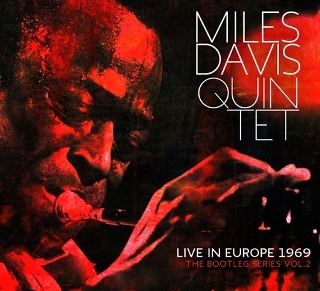
Miles Davis Quintet
Live in Europe 1969: The Bootleg Series Vol. 2
Columbia/Legacy (3 CDs and a DVD) ****
Recorded live in France, Sweden and Germany separated by less than four months these quintet recordings are a curiosity, the work of what’s being called a ‘lost band’ or more optimistically ‘the third great quintet’. It never released a studio album. The bootleg in the subtitle is slightly deceptive as these are official recordings made by European radio stations, not the work of fly-by-night characters with microphones hidden in their coats, and follow the first in the series a 1967 recording released two years ago. Miles is here with Wayne Shorter, the last remaining second quintet member besides the trumpeter; Chick Corea on electric piano and piano; Dave Holland on bass; and Jack DeJohnette, drums.
Tucked inside the box’s sleeve on the back of the pull-out notes there’s a black and white poster depicting four of the band with Wayne sporting a slight moustache caught in the middle of a solo, and Miles eyes shut standing beside him wearing leather trousers, DeJohnette at the back is in a stripy shirt, and a bearded Holland is looking down as he plays. They were even more snappily dressed in the Berlin video with Corea looking sombre.
Each album has stage introductions and share some songs although none are exactly the same in terms of tunes. There are two versions of ‘Miles Runs the Voodoo Down’, for instance, the first on the opening CD with Holland’s riff ringing clear and true. ‘Bitches Brew’ crops up on both the final CD recorded in Stockholm and on the DVD. Corea’s ‘This’ on the Stockholm CD, the producers note, Miles never officially recorded.
Downbeat writer Josef Woodward in the notes quotes Chick Corea who explains that the recordings “document an important step in Miles’ artistic development which take us from the famous suit-and-tie wearing quintet with Herbie… through to this quintet, which definitely leaned more towards the rock and beat generation.”
With electric piano and increased volume at times you can see what he means but how intense is the music? Well it’s not as in-your-face as say the Isle of Wight concert or some later studio sessions but there is plenty of fire power, the first a coiled fist within the velvet glove of ‘Sanctuary’ say and the abstractions of Corea on electric piano do give the music a very modernist edge. But contrast this with the beginning of ‘Milestones’, which sounds actually very old in the opening theme, like a jam session Miles might have played on in the earlier part of his career. Yet listen on and a transformation takes place: DeJohnette’s slashing rhythms are so very different. A track such as ‘Nefertiti’ on the second Antibes CD shows how modern the band is, the nihilism of Corea’s solo early on, say, and the blare and loneliness of ‘Sanctuary’.
George Wein’s polite introduction to the Stockholm concert leads into ‘Bitches Brew’ and this is when for me the music really gets going, more rock-inclined and getting pretty out there rapidly. DeJohnette is vital: providing rolling thunder in a makeshift laboratory. ‘This’, with its shrill opening, is an eye opener. Produced by Richard Seidel and Michael Cuscuna the set is yet another distinguished piece of curating “all in Honor of Miles Davis”. For the Miles Davis obsessive in your life, and those who are verging in that direction, it’s a must.
Stephen Graham